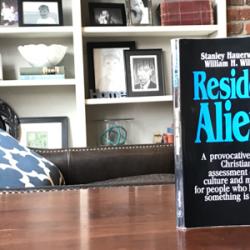I read this today and thought it looked pretty interesting… I might have to use some of my amazon.com-cred to get this one:
From Religion Dispatches: The Reverend Lillian Daniel’s latest book, When “Spiritual But Not Religious” Is Not Enough, will not disappoint readers who have come to enjoy her self-deprecating humor, her theological insights, and of course, snarky jabs at those fence-sitters who want it all: the SBNR.
The book is a collection of stories and essays, some more sermonic than others. There is a lovely reflection on being the “stand-in church” for a dying friend who was not a church member. A chapter on prayer explores the age-old question of why anyone should bother praying to an all-powerful, all-knowing deity—for Daniel, prayer is the prime antidote to self-deception. A tale about her angry grandmother and a naughty dog provides an opportunity to think about prejudice that perpetuates an us-vs.-them mentality. A memoir about often being the new kid in school causes her to consider the radical teachings of Jesus about whom it’s acceptable to eat with. A connection to an ancestor on the Mayflower provides fodder for thought about immigration in the 21st century.
Perhaps the most powerful chapter is a meditation on teaching a class among prisoners at Sing Sing. The writings of Paul the apostle about dying with Christ, in whom new life is hidden, has special resonance among people who are almost literally dead to the world, and whose new life is hidden behind bars.
At the center of most of these reflections is her congregation. It becomes clear that what is most important for her about Christianity is not its doctrines, narratives, sacraments, or even individual faith. It is community—the people who are “stuck with you.” What makes Christian community different from other kinds of community is the fact that it is shaped by a tradition of particular narratives and rituals and practices that, at least ideally, push back against self-serving consumer capitalist culture. It is for this reason—the lack of commitment to being stuck with any particular community of sinners—that the SBNR are particular targets of her judgment.
Daniel is writing primarily for Christians, and she is likely to appeal to the folks for whom ecclesiology is of primary concern. Roman Catholics and neo-orthodox post-liberals alike will especially appreciate her insistence on staying connected, not only to two thousand years of Christian tradition, but also to those annoying, smelly people next to you in the pews. Church, for these folks, is the only antidote to perverse secular rhythms and virtues, and Daniel is playing their song.












